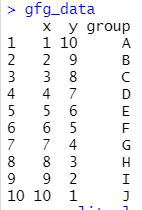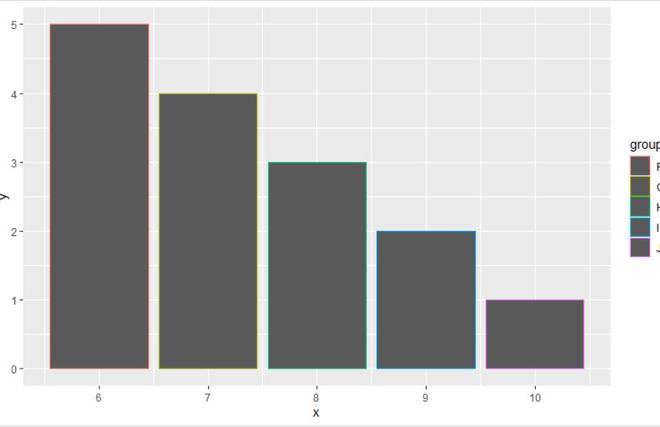在 R 中划分 ggplot2 图的图例
在本文中,我们将讨论如何在 R 编程语言中划分 ggplot2 图的图例。
要划分ggplot2图的图例,用户需要在R控制台中安装并导入gridExtra和cowplot包。
- gridExrta 包:提供许多用户级函数来处理“网格”图形,特别是在页面上排列多个基于网格的图,并绘制表格。
- cowplot 包: cowplot 包是 ggplot 的一个简单附加组件。它提供了有助于创建出版质量图形的各种功能,例如一组主题、对齐绘图并将它们排列成复杂复合图形的函数,以及使注释绘图和/或将绘图与图像混合的功能。
让我们先创建一个包含所有图例的情节,然后再将它们分开,以便差异更加明显。
使用中的数据:

例子:
R
library(ggplot2)
library(gridExtra)
library(cowplot)
gfg_data <- data.frame(x = 1:10, y = 10:1, group = LETTERS[1:10])
ggp_plot<- ggplot(gfg_data, aes(x,y,color = group)) +
geom_bar(stat="identity") +scale_color_manual(values = 1:10) +
labs(color = "Legend-1")
ggp_plotR
# legends for two
library(ggplot2)
library(gridExtra)
library(cowplot)
gfg_data <- data.frame(x = 1:10, y = 10:1, group = LETTERS[1:10])
gfg_split_1 <- gfg_data[gfg_data$group %in% c("A", "B"), ]
gfg_split_1
ggp_split_plot_1 <- ggplot(gfg_split_1, aes(x,y,color = group)) +
geom_bar(stat="identity")+scale_color_manual(values = 1:2) +
labs(color = "Legend-1")
ggp_split_plot_1R
# legends for three
library(ggplot2)
library(gridExtra)
library(cowplot)
gfg_data <- data.frame(x = 1:10, y = 10:1, group = LETTERS[1:10])
gfg_split_2 <- gfg_data[gfg_data$group %in% c("C", "D","E"), ]
gfg_split_2
ggp_split_plot_2 <- ggplot(gfg_split_2, aes(x,y,color = group)) +
geom_bar(stat="identity")+
scale_color_manual(values = 1:3) +labs(color = "Legend-1")
ggp_split_plot_2R
# legends for rest of the data
library(ggplot2)
library(gridExtra)
library(cowplot)
gfg_data <- data.frame(x = 1:10, y = 10:1, group = LETTERS[1:10])
gfg_split_3 <- gfg_data[! gfg_data$group %in% c("A","B","C", "D","E"), ]
gfg_split_3
ggp_split_plot_3 <- ggplot(gfg_split_3, aes(x,y,color = group)) +
geom_bar(stat="identity")+scale_color_manual(values = 1:5) +
labs(color = "Legend-1")
ggp_split_plot_3输出:

要划分图例,请从数据框中提取较小的数据样本,并应用具有适当参数的所需函数来生成所需的图。
例子:
电阻
# legends for two
library(ggplot2)
library(gridExtra)
library(cowplot)
gfg_data <- data.frame(x = 1:10, y = 10:1, group = LETTERS[1:10])
gfg_split_1 <- gfg_data[gfg_data$group %in% c("A", "B"), ]
gfg_split_1
ggp_split_plot_1 <- ggplot(gfg_split_1, aes(x,y,color = group)) +
geom_bar(stat="identity")+scale_color_manual(values = 1:2) +
labs(color = "Legend-1")
ggp_split_plot_1
输出:

例子:
电阻
# legends for three
library(ggplot2)
library(gridExtra)
library(cowplot)
gfg_data <- data.frame(x = 1:10, y = 10:1, group = LETTERS[1:10])
gfg_split_2 <- gfg_data[gfg_data$group %in% c("C", "D","E"), ]
gfg_split_2
ggp_split_plot_2 <- ggplot(gfg_split_2, aes(x,y,color = group)) +
geom_bar(stat="identity")+
scale_color_manual(values = 1:3) +labs(color = "Legend-1")
ggp_split_plot_2
输出:

例子:
电阻
# legends for rest of the data
library(ggplot2)
library(gridExtra)
library(cowplot)
gfg_data <- data.frame(x = 1:10, y = 10:1, group = LETTERS[1:10])
gfg_split_3 <- gfg_data[! gfg_data$group %in% c("A","B","C", "D","E"), ]
gfg_split_3
ggp_split_plot_3 <- ggplot(gfg_split_3, aes(x,y,color = group)) +
geom_bar(stat="identity")+scale_color_manual(values = 1:5) +
labs(color = "Legend-1")
ggp_split_plot_3
输出:
